FW
Karl Mayer has been equipping customers with warp knitting expertise since 1960, and its training programs remain highly sought after. In 2024, the company conducted 104 courses for 432 learners across academies in Germany, China, India, Japan, and Turkey. Its online training platform, launched in 2022, is also gaining traction, with 564 active accounts from 50 countries by December 2024.
“We’re seeing a shift from on-site training to digital formats,” says Sophia Krinner, Product Owner Academy at Karl Mayer. Many professionals now find online courses sufficient, reducing the need for travel. The 2025 program opens for enrollment in January, with a 25 per cent discount on the ‘Introduction to Warp Knitting’ e-learning course in February.
While over half of last year’s courses followed the standard program, demand for specialized training is rising, particularly in fishing net production, process optimization, and quality improvement. These sessions often take place at customers’ facilities, ensuring practical relevance.
Trainees praise the courses for enhancing their technical skills. “I now understand the connection between machine parts and product properties,” says Fang of Shawmut Corp., USA. Others highlight the impact on their daily work and design innovations.
Karl Mayer continues expanding its digital offerings, adding courses on energy efficiency and textile analysis in 2024. A new warp knitting knowledge check, launched in January 2025, helps customers assess their skills and choose the right courses.
Expanding its brand’s international presence, footwear brand Steve Madden has acquired UK-based luxury brand Kurt Geiger for £289 million (approximately $360.09 million) in an all-cash transaction.
Owner of brands like Dolce Vita and Betsey Johnson, New York-based Steve Madden plans to purchase Kurt Geiger from private equity firm Cinven. Kurt Geiger's portfolio includes the KG Kurt Geiger and Carvela brands, sold in luxury and premium department stores such as Harrods and Selfridges.
Expected to close in Q2, FY25, the deal will be funded through a combination of existing cash reserves and debt. Kurt Geiger generated revenues worth £400 million for the 12 months ending February 1, 2025. On the other hand, Steve Madden's 2024 revenue is projected to reach $2.25 billion, according to LSEG data.
The company previously outlined plans to diversify its product sourcing away from China following the outcome of the US presidential election.
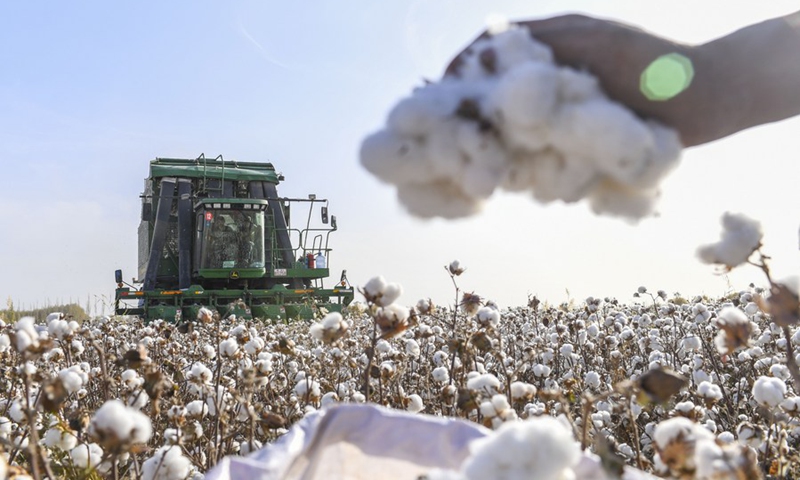
China’s Xinjiang region synonymous with cotton is deeply entangled in controversy, raising ethical and economic questions that reverberate throughout the global supply chain, including impacting India's cotton trade.
Xinjiang's dominance in Chinese cotton production
Xinjiang accounts for a staggering proportion of China's cotton output. Recent estimates suggest over 80 per cent of China's cotton originates from Xinjiang, with the region producing around 5 million tonnes annually. This dominance is driven by several factors like favorable climate, as Xinjiang's dry climate and ample sunshine create optimal growing conditions for cotton. The Chinese government has heavily invested in Xinjiang's cotton industry, providing subsidies and infrastructure development. And large-scale farms in Xinjiang have readily adopted mechanized harvesting, increasing efficiency and output.
In fact, Xinjiang's cotton production has significantly impacted China's overall cotton industry. First it has help in reducing imports as China, once a major cotton importer, has seen its import dependence decrease due to Xinjiang's production surge. This has direct implications for India, a major cotton exporter. On the other hand exports have grown. China has emerged a significant exporter of cotton yarn and finished textile products, leveraging Xinjiang's cotton. This increased competition affects Indian textile exports. Xinjiang cotton also helps China's massive textile industry, feeding domestic demand for apparel and other goods.
India's perspective
While India is a major cotton producer, the dynamics of Xinjiang's production influence its cotton trade with China. First is that it has resulted in lowering exports to China as China's domestic production increases, reliance on Indian cotton imports diminishes. This is reflected in the declining trend of raw cotton exports from India to China. However, India has seen a rise in cotton yarn exports to China. This suggests that despite Xinjiang's cotton dominance, there is still demand for specific yarn varieties and qualities that India can fulfill. The rise of China as a textile exporter, has been led by Xinjiang cotton and this presents competition for India in the global market.
Table: China’s cotton production, imports
|
Year |
China's cotton production (mn tons) |
Xinjiang's Share (%) |
China's cotton imports (mn tons) |
India's cotton exports to China (mn tons) |
India's cotton yarn exports to China ($ mn) |
|
2021 |
5.9 |
85 |
2 |
0.8 |
550 |
|
2022 |
6 |
87 |
1.8 |
0.6 |
680 |
|
2023 |
6.1 |
90 |
1.5 |
0.5 |
720 |
|
2024 |
6.2 |
94.8 |
1.0 (estimated) |
0.4 (estimated) |
750 (estimated) |
(Source: National Bureau of Statistics of China, USDA Foreign Agricultural Service, Ministry of Commerce and Industry India, Texprocil)
Table: China’s leading cotton trading partners
China's exports: Vietnam, Bangladesh, Pakistan, Turkey
China's imports: United States, Brazil, Australia
India's Exports: Bangladesh, Vietnam, China, Pakistan
Uncertainties, controversies arond Xinjiang cotton
There are several controversies around cotton from the Xinjiang region. Allegations of forced labor in Xinjiang continue to cast a shadow over the region's cotton industry. This impacts the ethical sourcing policies of many companies globally, including those in India. Meanwhile trade disputes and political pressures related to Xinjiang cotton create uncertainty in the global market. This can disrupt established trade flows and impact Indian exporters. The environmental impact of cotton production in Xinjiang, including water usage, is also a growing concern. This raises questions about the long-term viability of such large-scale cotton production.
However, the fact is Xinjiang cotton plays a pivotal role in China's domestic textile industry and holds significant sway in the global cotton market. This has direct and indirect consequences for India's cotton trade, impacting its exports of raw cotton and yarn to China. While India continues to be a significant player in the global cotton market, navigating the complexities arising from Xinjiang's production, including ethical concerns and geopolitical tensions, remains crucial for India's cotton industry.
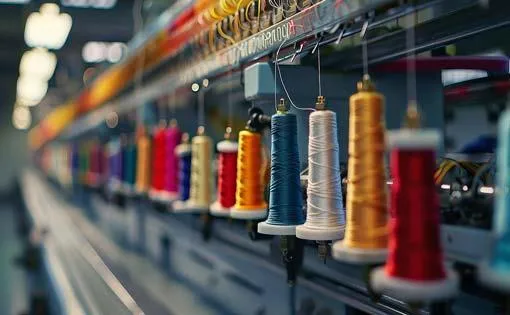
India's textile and apparel industry, while deeply rooted in history, faces significant supply chain challenges in fibers, yarns, and fabrics. Though renowned for its cotton and silk production, the industry struggles with modernization, fragmentation, and reliance on imports. These hurdles prevent it from fully capitalizing on the burgeoning domestic fashion market and establishing a dominant global presence.
A legacy industry at a crossroads
With a history tracing back to the Indus Valley Civilization, Indian textiles have long enjoyed global acclaim. Today, key manufacturing hubs such as Tirupur (knitwear), Surat (textiles), and Ludhiana (hosiery) remain integral to the sector. However, the industry faces structural challenges, including a fragmented supply chain, outdated technology, and logistical inefficiencies. Additionally, dependence on imported raw materials for specialized fabrics adds to production costs. Despite these issues, India’s growing fashion and apparel sector could serve as a powerful catalyst for change.
Growing influence of fashion and apparel sector
The Indian fashion and apparel market has seen major growth. Statista projects the sector will reach Rs 171.60 billion (approximately $20.8 billion) by 2034, growing at a CAGR of 4 per cent between 2025 and 2034. This growth is due to rising disposable incomes, urbanization, e-commerce expansion, and heightened awareness of global fashion trends.
Indian designers and brands are not just imitating Western styles but are innovating with uniquely Indian aesthetics. Designers like Manish Malhotra, Sabyasachi Mukherjee, and Anita Dongre are gaining international recognition, showcasing India’s rich craftsmanship. Additionally, the rise of conscious consumerism is pushing brands toward sustainability, eco-friendly textiles, and ethical sourcing.
Fashion’s impact on the textile supply chain
The fashion and apparel sector has the potential to transform the textile supply chain by driving demand, fostering innovation, and strengthening industry collaborations.
Demand as a catalyst: The growing appetite for diverse, high-quality fabrics encourages investment in fiber production, yarn spinning, and fabric manufacturing, leading to modernization and expansion.
Focus on quality & innovation: The need for advanced textiles, such as moisture-wicking and antimicrobial fabrics, pushes manufacturers toward innovation and technology upgrades.
Collaboration & partnerships: Strengthening ties between fashion brands and textile manufacturers ensures industry-specific needs are met while providing stability and long-term growth opportunities.
Investment & infrastructure: A thriving fashion industry attracts investment in textile parks, manufacturing facilities, logistics, and research institutions.
Key areas for action
Fiber diversification: Heavy reliance on cotton exposes the industry to price and yield fluctuations. Encouraging alternative natural fibers like linen, hemp, and bamboo, along with advancements in man-made fibers, will reduce dependency on imports.
Sustainability & circularity: The industry must embrace organic cotton, recycled fibers, and eco-friendly dyes while implementing circular economy practices like textile recycling.
Yarn & fabric manufacturing challenges: The sector remains fragmented, with many SMEs lacking economies of scale, investment in automation, and standardized quality control, affecting global competitiveness.
Supply chain efficiency: Inefficiencies in logistics, cold storage, and communication among stakeholders increase operational delays and costs.
Technology & innovation: Investing in automation, digital technologies, and R&D will help improve efficiency and competitiveness in the global market.
Skill development: Expanding training programs for textile engineers, designers, and manufacturing personnel is crucial to ensuring long-term growth and expertise.
Policy support: Policies that incentivize textile investment, support exports, and improve infrastructure are essential for sustained development.
Branding & marketing: Strengthening India’s global image through trade shows, digital campaigns, and ‘Made in India’ branding can enhance market positioning.
Many Indian brands and manufacturers are already making strides toward innovation and sustainability. For example, Fabindia a leader in natural fabrics and traditional Indian craftsmanship is supporting local artisans and weavers. R|Elan is pioneering sustainable fashion with recycled polyester and eco-friendly materials. Global brands like M&S are increasing reliance on Indian suppliers for ethically produced textiles.
The bottomline is India’s textile and apparel industry stands at a crucial juncture. By leveraging fashion as a growth driver, the country can create a robust and self-sufficient textile ecosystem, positioning itself as a global leader. However, success will depend on collaboration between fashion brands, manufacturers, policymakers, and research institutions. By focusing on innovation, sustainability, and skill development, India can weave a stronger, more competitive textile future, driven by the power of fashion.
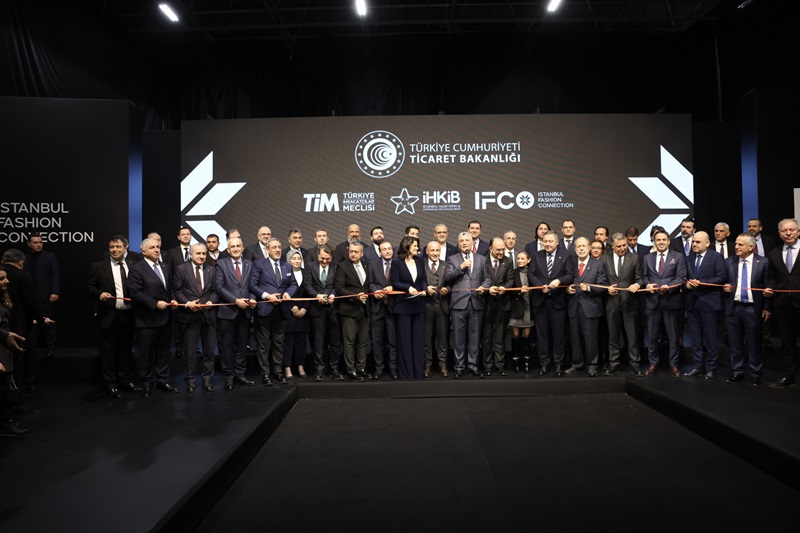
The seventh edition of IFCO, Istanbul Fashion Connection took place from February 5 to 8, 2025, attracting 33,788 visitors and 514 exhibitors from 151 countries. Hosted at the Istanbul Expo Centre, the event showcased a diverse range of fashion categories across eight halls, reinforcing Turkiye’s growing influence in the global fashion industry. The largest international visitor groups came from the Middle East (32.5 per cent), Asia (25.1 per cent), Europe (23.1 per cent), and North Africa (14.6 per cent).
Global platform for fashion and business
Turkiye, the world’s sixth-largest apparel supplier and the third-largest in the EU, aims to transition from a manufacturing hub to a global fashion leader. Mustafa Gultepe, President of TIM & IHKIB, emphasized the country’s strengths in design, branding, and technology, noting that Turkish brands now operate over 3,000 stores in more than 100 countries. IFCO plays a key role in this vision, establishing Istanbul as a major fashion hub in Europe.
The event provided a global networking platform, bringing together international buyers and fashion leaders. Major participants included brands from the USA, UK, France, Germany, Spain, Canada, and the Middle East, leveraging IFCO’s B2B meetings and trade connections to expand their market reach.
Showcasing diverse fashion categories
Spanning 35,000 square meters, IFCO featured key segments such as womenswear, menswear, kidswear, denim, sportswear, evening and wedding wear, lingerie, hosiery, leather garments, shoes, and accessories. TheCore Istanbul, a key highlight of the event, provided a dedicated space for over 25 designers to present their collections. Notable participants included Maison Kaisros, Alaii, Syga, Denim Heads, Tuba Ergin, Eynaco, Bianco E Nero, and Mirimalist. Designers reported strong buyer engagement, with many securing new business deals.
The IFCO Brands section featured major market players like Jakamen, Sabri Ozel, Jimmy Key, NCS, Kayra, Armine, Rojbey, and Kigılı, all of whom showcased their latest collections in individually designed store-like booths. The IFCO Kids section expanded significantly, doubling in size with 40 manufacturers in Hall 8. The LinExpo lingerie and hosiery segment occupied two halls, while FashionIST highlighted high-end eveningwear.
High-profile buyers and industry insights
IFCO 2025 saw a 5.3 per cent increase in international visitors compared to last year, with 42.1 per cent of attendees coming from abroad. Prominent buyers included John Lewis, J.P. Boden & Co (UK), Monsoon Brand Ltd (UK), Nicoli Network (Spain), Aeon Co (Malaysia), Ariat (USA), Aritzia (Canada), and Groupe Vanessa Bruno (France). The event’s structured B2B meetings facilitated direct business discussions and partnership opportunities.
The IFCO Trend Area, designed in collaboration with the Fashion Designers Association (MTD), focused on ‘Mindscape,’ a theme blending science, digital innovation, and sustainability. The Istanbul Fashion Academy (IMA) highlighted how modern technology and traditional knowledge drive eco-conscious fashion. Industry seminars covered key topics, including Spring/Summer 2026 trends from WGSN, the role of AI in fashion marketing, and the impact of digitalization on apparel design.
Sustainability and digital transformation at the core
Turkiye’s fashion industry has been at the forefront of digitalization and sustainability, aligning with global standards even before the EU’s Green Deal. Mustafa Paşahan, Vice President of IHKIB and IFCO Fair Executive Committee President, emphasized the industry's investments in sustainable production and digital advancements. IHKIB continues to lead Turkiye’s efforts in integrating EU-supported programs to drive this transformation.
Since its launch, IFCO has hosted 2,552 exhibitors and 153,000 visitors across 160,533 square meters. The event has rapidly established itself as Europe’s largest fashion fair. The upcoming eighth edition of IFCO is scheduled for August 20-22, 2025, promising another impactful showcase of Turkiye’s fashion industry.
Northern India Textile Research Association (NITRA) has developed a groundbreaking 80:20 wool-milkweed fiber blend that offers twice the warmth of wool, exceptional softness, and a lighter weight. Developed in collaboration with industry partners, this blend has proven to be industrially viable, outperforming 100 per cent wool in thermal insulation, weight reduction, and softness.
As per sources from the Textile Ministry, able to withstand temperatures as low as -50 degrees Celsius, this fiber blend is set to be showcased at Bharat Tex in Delhi from February 14-17, 2025. Milkweed's versatility extends to apparel, home textiles, and hygiene products, potentially replacing conventional fibers in various applications. Ludhiana-based Ganga Acrowools is integrating the blend into its production.
Despite a large sheep population, India relies heavily on imported fine-grade wool, spending nearly Rs 1,800 crore in FY 2023-24. Limited production of high-quality domestic wool, particularly Pashmina, necessitate a sustainable alternative, note officials.
A perennial crop, Milkweed offers a sustainable solution. Requiring minimal inputs, the fiber yields for up to 10 years, with increasing production annually. Farmers can earn Rs 1.5-2 lakh per acre cultivating milkweed, significantly more than traditional crops like cotton. Derived from the seed pods, the fiber provides nearly double the thermal insulation of 100 per cent polyester nonwoven fabric. This innovative blend promises to revolutionize the textile industry, offering a superior and sustainable alternative to traditional wool.
The upcoming Textile and Garment Policy 2025-30 will help Karnataka position itself as India's new textile and apparel (T&A) capital, says K Jyothi, Textiles Commissioner. Focusing on technical textiles, the policy will announce increased incentives for investors, she adds. It will also propose the development of two new technical textile units, she states further.
Adopting a comprehensive approach, the policy will incorporate feedback from stakeholders at all levels, emphasizes K Jyothi. It will be finalized and implemented before the next financial year, she adds.
Sanjay Arora, Transaction Advisor, PM Mitra Park, says, while not a direct copy, the new policy will emulate successful models like China’s ‘sock city.’ The Indian fashion industry is becoming increasingly mature with consumers now purchasing clothes seasonally rather just during festivals, Arora highlights. This changing frequency of their clothing purchases, presents a significant opportunity for the textile sector, he adds.
With exports increasing to $100 million, India’s textile market is projected to reach $350 billion by 2030, avers Arora. The PM Mitra textile park in Kalaburagi will include a dedicated zone for traditional handloom weavers, protecting their interests, he assures.
The Invest Karnataka 2025 GIM attracted a diverse range of investors, including established businesses and young entrepreneurs. The event witnessed significant commitments to the state's textile sector. For instance, Big Bags International pledged to invest $100 crore for a technical textile unit. Other MoUs totaling approximately $50 crore were signed for garment manufacturing, a poly-woven socks printing unit, and rapier weaving units.

The India Sourcing Enclave at Bharat Tex 2025 witnessed a compelling discussion on the crucial role of Environmental, Social, and Governance (ESG) factors in the textile industry. Manish Pande's presentation, "Execution of ESG in Textiles," provided a roadmap for navigating the evolving regulatory landscape and harnessing the power of ESG for business growth.
Pande emphasized the increasing importance of ESG compliance in accessing international markets. He highlighted the growing scrutiny from major players like the EU, US, and China, stressing that adherence to ESG standards is no longer optional but a necessity for survival in the global marketplace. "If there is compliance, you would be invited," he stated, warning that businesses failing to adapt risk being replaced by competitors who are quicker to embrace sustainable practices.
The presentation underscored the challenges faced by small and medium enterprises (SMEs) in understanding, building capacity for, and demonstrating ESG compliance. Pande outlined the current regulatory framework in India, including the BRSR (Business Responsibility and Sustainability Reporting) and standards developed by the Bureau of Indian Standards (BIS), and the need for a unified approach.
A key takeaway was the potential of ESG to unlock significant benefits, including improved market access. Pande envisioned a user-driven portal that integrates various regulatory frameworks into a single scheme, facilitating capacity building through organizations like FIO (Federation of Indian Export Organizations), promoting supply chain digitization, and fostering collaborative initiatives for international recognition of ESG efforts. He also highlighted the increasing importance of ESG scorecards in investment decisions, influencing access to loans and incentives from financial institutions.
Pande showcased QCI's (Quality Council of India) digital-ready certification program for MSMEs, demonstrating how ESG principles can be integrated into existing platforms. He explained how modules on ESG compliance could be incorporated into mobile apps used by MSMEs, enabling them to educate their supply chains and obtain certifications that demonstrate their commitment to sustainability. This initiative aims to make ESG an integral part of doing business for MSMEs, the backbone of the textile supply chain.
The presentation concluded with a call for a collaborative approach involving all stakeholders to drive ESG adoption in the textile industry. Pande's insights provided a valuable framework for businesses to not only meet regulatory requirements but also leverage ESG as a driver of innovation, competitiveness, and long-term success in the global textile market. The message was clear: weaving a sustainable future is not just an ethical imperative, but a strategic advantage.
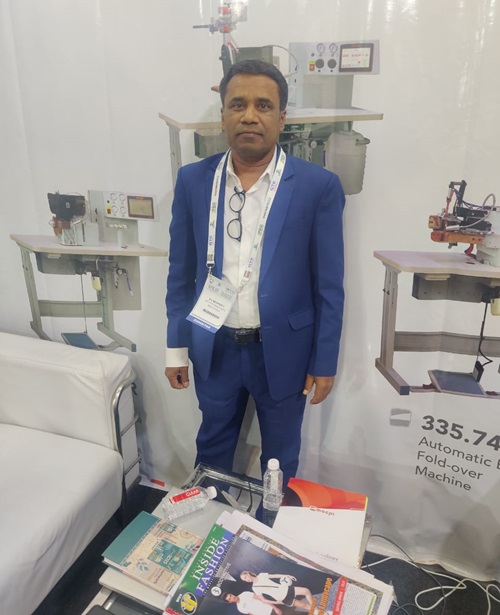
The global sourcing landscape is in constant flux, and MACPI, under the leadership of BK Mohanti, Director and Country Head for India, is strategically positioned to leverage India's growing prominence in the apparel and textile sector. Recent geopolitical shifts and challenges faced by established players are creating significant opportunities for India, and MACPI is poised to capitalize on these evolving dynamics.
India: A beneficiary of shifting global trade dynamics
The apparel industry is witnessing a notable shift away from traditional manufacturing hubs. Mohanti observes that while Bangladesh has long been a dominant force, recent difficulties have prompted international buyers to seek alternative sourcing destinations. India has emerged as a compelling option, though Mohanti cautions that its production capacity is still under development and may not yet be sufficient to fully absorb the influx of new business.
Despite this limitation, India's strength lies in the quality of its output. Mohanti characterizes the Indian apparel sector as producing medium-to-high-quality goods, a key factor in attracting international buyers. To solidify this advantage, India must focus on streamlining delivery times and expanding its production capacity.
Navigating opportunities and overcoming obstacles
Geopolitical tensions, particularly the trade relationship between China and the United States, present a unique window of opportunity for India. Mohanti believes India can strategically leverage the "China plus one" strategy, a diversification approach adopted by companies seeking to reduce their reliance on China. However, he also acknowledges India's dependence on Chinese raw materials in certain sectors, highlighting the complex interplay of opportunities and challenges.
India's Dual Advantage: Robust domestic market and developing infrastructure
India possesses a significant advantage in its large and dynamic domestic market, coupled with a steadily improving infrastructure. Mohanti emphasizes that India's manufacturing sector is bolstered by substantial internal demand, which complements its engagement in the global market. This dual focus provides a strong foundation for India's ambitions to expand its global sourcing footprint.
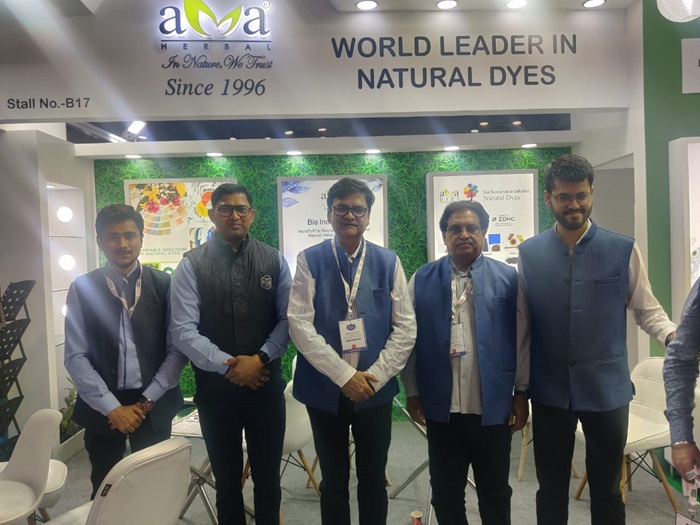
In a world increasingly aware of environmental issues, the textile industry stands out as a significant contributor to pollution. However, a revolution is brewing within this sector, led by pioneers like Yawer Ali Shah, co-founder and CEO of AMA Herbal Laboratories Private Limited. Since 1996, Yawer has championed the use of natural dyes, long before sustainability became a buzzword in the industry.
Yawer's journey began at a seminar hosted by a German company, Zeneca, in the mid-90s. It was here that he learned about the impending bans on azo dyes in Europe, a pivotal moment that ignited his passion for natural alternatives. "At that time, people were only talking about azo-free products," Yawer recalls. "But I realized that the future lay in natural dyes, which are inherently safer and more sustainable."
Natural dyes, derived from plants and minerals, offer a stark contrast to synthetic dyes, which often rely on harmful chemicals. Yawer emphasizes that the textile industry is responsible for a staggering amount of pollution, with over 800 chemicals potentially involved in the dyeing process alone. "Only a fraction of these chemicals have been researched," he warns, highlighting the uncertainty surrounding the safety of many synthetic dyes. "What is considered safe today may be banned tomorrow."
Despite the clear benefits of natural dyes, challenges remain. Issues such as dye consistency, speed, and year-round availability have historically hindered their widespread adoption. However, Yawer's innovative approach addresses these concerns. His company employs a unique, water-based extraction process that eliminates the need for high temperatures and reduces water consumption significantly compared to traditional methods. "Our process is not only eco-friendly but also efficient," he states proudly. "We are chemical-free and reduce energy usage, making natural dyes a viable option for modern textile production."
As the global demand for sustainable textiles grows, Yawer believes that natural dyes will become more economically feasible. "The perception that natural dyes are costly stems from our inability to scale production," he explains. "Once we achieve economies of scale, the costs will align with those of synthetic dyes."
The future of natural dyes looks promising, especially with increasing regulatory pressures in regions like Europe. As bans on harmful chemicals loom, the textile industry is poised for a shift towards safer, more sustainable practices. "Natural dyes have already passed various sustainability standards without modification," Yawer points out. "They are derived from nature, and nothing in our process harms the environment."
Yawer's vision extends beyond just creating a product; he aims to inspire a movement. "We need to educate consumers and manufacturers alike about the benefits of natural dyes," he asserts. "As awareness grows, so will the demand for sustainable options."












